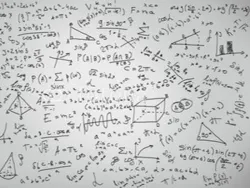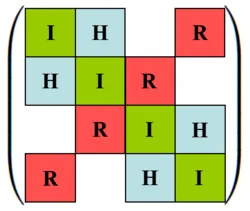
Quantum many body problems
are encountered when quantum particles interact strongly such as the electrons in most molecules and solids. The wavefunction then is a complicated object, but those systems can still be studied using a wide range of mean field approaches or correlated methods of quantum chemistry and quantum physics.
Interesting effects occur when molecules or solids response to external perturbations like electric or magnetic fields (e.g., light) or variations in temperature.

Polarons, electron transfer and transport in organic materials
The great challenge is the sizable electron-phonon coupling in these systems which need to be addressed non-perturbatively. Here I developed a transport theory in the past and my group is elaborating improvements and applies it to various interesting systems. The connection to a full first-principles parameterization makes it specific for individual systems. Recently, we have derived a theory describing charge transport in the hopping limit. It is based on a description of the vibration modes with their frequencies and hopping time in a time-consistent way.
Further reading: Phys. Rev. B 2009, New. J. Phys. 2010, Phys. Stat. Sol B 2011, Adv. Funct. Mater. 2015, J. Am. Chem. Soc. 2017, Phys. Rev. B 2021, Phys. Rev. B 2022, npj Comput. Mater. 2022
Non-equilibrium dynamics and localization
Transport phenomena at different lengh scales and times cales are under investigation here. Multiple quantum interferences are important when studying weak-localization/weak antilocalization phenomena. The time domain approaches can be used to study topological properties
Further reading: EPL 2011, Phys. Rev. Lett. 2013, Phys. Rev. Lett. 2013, Phys. Rev. B 2011, Phys. Rev. Lett. 2021

Spin physics and spin coherence
Here we are looking into the electron’s spin degree of freedom. Long spin coherence times are essential for any kind of spintronic application and possible relaxation mechanisms are studied.
Further reading: Phys. Rev. Lett. 2012, Nature Phys. 2014, 2D Mater. 2015, Sci. Rep. 2016, Adv. Funct. Mater. 2018